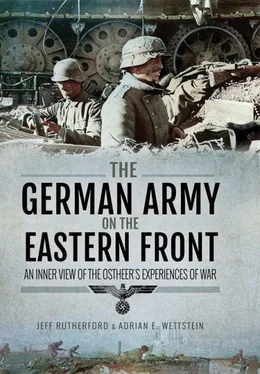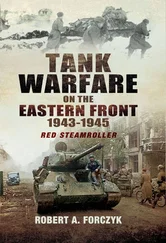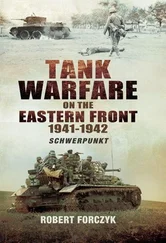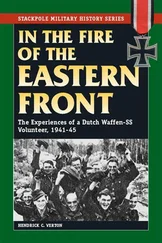a) the troops’ baggage now primarily consists of soldiers who possess neither the mental nor physical preconditions to be a combat soldier.
b) the supply troops heavily consist of older age groups and last sons and so on.
c) even the baggage and supply troops must possess an element of defensive strength to defend themselves.
The following guidelines for the employment of Hilfswillige result from this:
1) The troops are to be supplied Hilfswillige not numerically, but rather according to urgently needed jobs and from well-disposed peoples.
2) Hilfswillige are not acceptable as cooks, hand-workers or drivers of German vehicles.
3) Some 800 Hilfswillige for permanent posts are suitable for an infantry division, primarily in driver and co-driver positions.
4) Each Grenadier Regiment and Engineer Battalion urgently desires a Hilfswillige construction company of about 120 Hilfswillige in addition to the 800 Hilfswillige in permanent posts.
The contradictions and prejudices that formed the basis of German occupation policy clearly emerge in this document. On the one hand, the army’s need for Soviet manpower was quite evident and the 7th Infantry Division ordered that its men treat the volunteers as allies in the fight. On the other hand, it was evident that Germans did not entirely trust the natives in their ranks based on both experience and ideology, and the casual racism that underlay beliefs such as the Soviets being incapable of taking care of German horses or driving German vehicles meant the Hilfswillige were not exploited as fully as possible. Nonetheless, the integration of Soviet men into the ranks of the German army heralded a new stage in the army’s approach to the war in the east.
In fact, during the Stalingrad campaign, the 24th Panzer Division even utilized Soviets for combat roles, as the following report notes: [40]
The Division is trying to increase combat strength through all kinds of means. Numerous Hilfswillige are hired as craftsmen, drivers, cooks and ammunition carriers. Individuals have proven themselves as machine gunners, even entire rifle groups from Russians were formed. In this way around 700 soldiers have been freed for the front.
The shift to total war was made adamantly clear by Ninth Army (code-named Group Weiss during the planning period for Operation Citadel) in May 1943. The army command’s order indicates the Germans’ attempt to systematically exploit the Soviet Union’s resources – food, natural resources, and manpower – in a way that far surpassed all previous measures. [41]
Special Order for the Registration and Collection of Prisoners of War, Labour Power and Plunder Seized Goods, as well as for the Military Administration
I) In General
1) Total war demands the total employment of all labour power and the complete registration and collection of all materials important for the war. Every prisoner of war and civilian capable of labour equals a worker, every captured weapon a savings of raw material and labour output. The supply of workers to the Heimat is therefore of decisive importance. The value of prisoners of war and the maintenance of their labour power and the necessity of a complete registration and collection of seized materials are to be looked at from this point of view and made clear to all soldiers.
2) The registration and collection of all prisoners of war, workers, and plunder seized materials will be centrally led. For this registration and collection, as well as captured goods, staffs will be deployed and equipped with sweeping powers of command, passes, external identification, and executive bodies (army sectors special army patrols ). They are empowered to enforce their orders in situ.
The captured goods and registration and collection staffs are to be supported by the troops in every respect with the postponement of their own special interests. […]
II) Registration of Prisoners of War
1) The prisoners of war are to be immediately shipped rearward by the troops to the divisions’ prisoner of war collection points. […]
An overstraining of these prisoners of war must never happen. […]
2) The selection of Hilfswillige for the troops occurs in the prisoner of war transit camps of Group Weiss. The divisions will be allocated Hilfswillige- candidates in correspondence with their vacant spots and the number of the delivered prisoners of war.
3) The treatment of POWs is to be given the necessary attention by all superiors. Sufficient food and shelter according to local circumstances is to be provided. It must be accepted by infusing into every soldier that it depends on the preserving of the labour strength of each one of the prisoners to its fullest extent. Wounded and sick prisoners are to be medically treated.
The POWs are allowed to keep pieces of clothing and equipment (above all mess tins, drinking mugs, spoons, etc.). It is to be drummed into the heads of the POWs that they will receive no replacements for the clothes and equipment that they give away in exchange for tobacco, etc. […]
III) Registration of Workers
With the occupation of villages and towns, all draft-age men, separated from prisoners of war, are to be collected and left to be led back in cooperation with the POW installations.
The female population capable of work is initially to be locally registered and deployed for work there.
The recruitment for the Reich Labour Action in the Reich will be carried out as soon as possible by the deployed worker registration and collection troops.
IV) Registration of Seized Goods
1) The troops can only keep seized goods required for the replenishment of their own needs, with the exception of the following guns:
7.62cm Howitzer-canon,
20.3cm Mortar
The seized goods not needed for replenishment are to be obligatorily given up in the interests of other troops under the responsibility of the commander.
Every senseless cannibalization of vehicles and weapons etc. is to cease. The troops are to be immediately instructed about this. The carrying out of this order is to be supervised.
2) The troops are already to begin with the recording and collection of captured goods if possible. […] Especially important is the recovery of optical equipment and weapons. In addition, individual pieces from weapons, equipment and vehicles that are no longer completely useable are urgently required as replacement spare parts and for repair maintenance. Captured field kitchens are first and foremost foreseen for POW installations.
3) Captured food and fuel stocks are to be immediately reported to Group Weiss so that they can be systematically used in order to relieve the supply situation. […]
V) Military Administration
1) In the recently occupied territories, the administration is to be established again by the Army Corps Headquarters according to the previously issued orders as soon as the situation allows for it. Orders for the transfer of rear areas to Group Weiss are to be enacted in a timely manner.
2) The following measures are to be immediately taken with the occupation of villages and towns:
a) Registration and concentration of all draft age men (compare with III.). An immediate and thorough search for hidden Red Army men, soldiers, weapons, and ammunition, as well as enemy agents left behind, in cooperation with the Field Gendarmerie and the Secret Field Police. Over and above that, enemy radio sets, passenger pigeons, and messenger dogs are to be searched for, as the enemy has recently used dogs again for the transmission of intelligence. A careful thorough search of the planned quarters for built-in explosive charges. Above all caution by the lighting of the oven, as experience shows that explosives are not only behind doors and under carpets, but are also built into chimneys.
Читать дальше






![John Stieber - Against the Odds - Survival on the Russian Front 1944-1945 [2nd Edition]](/books/405234/john-stieber-against-the-odds-survival-on-the-russian-front-1944-1945-2nd-edition-thumb.webp)





